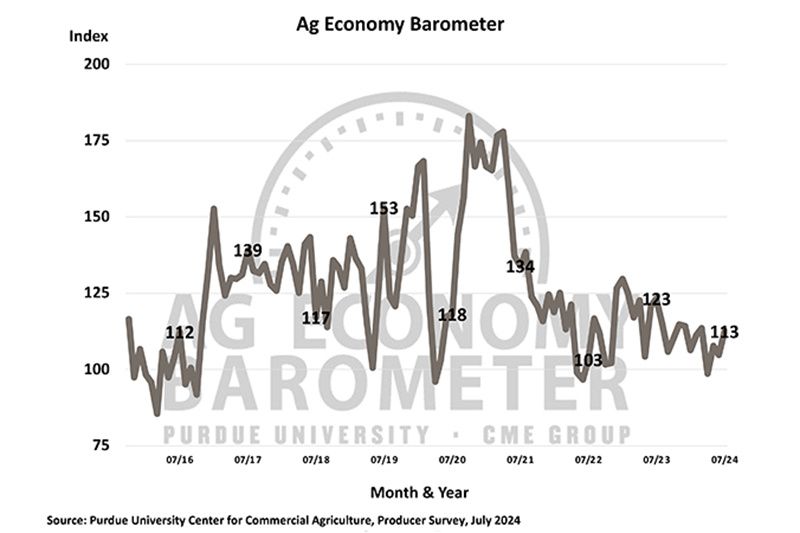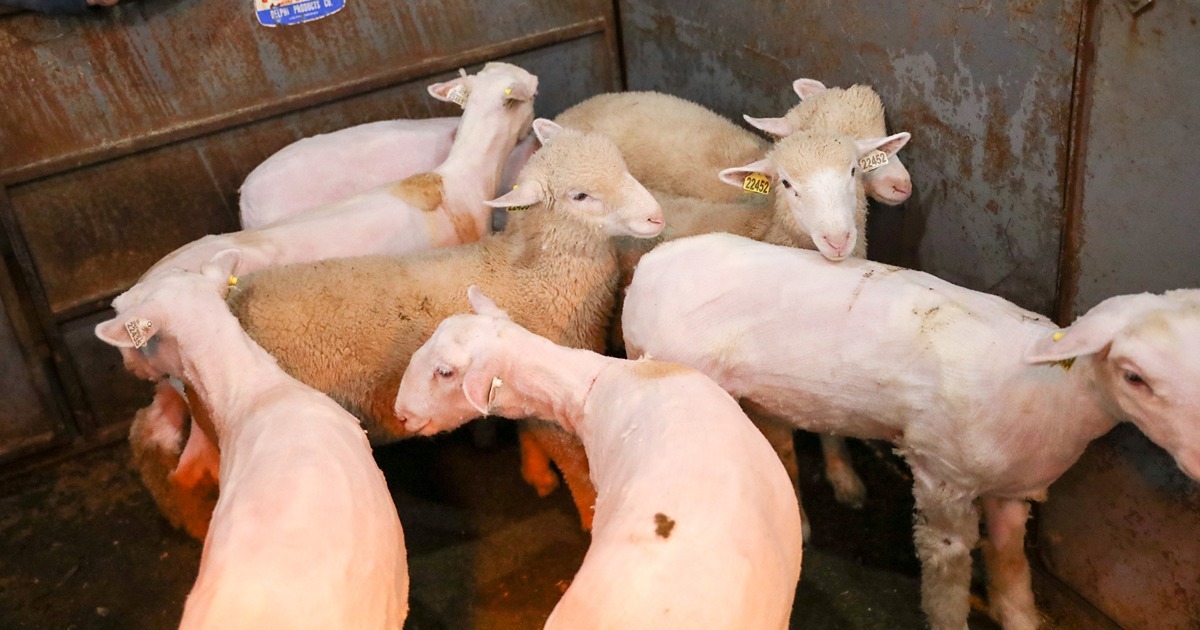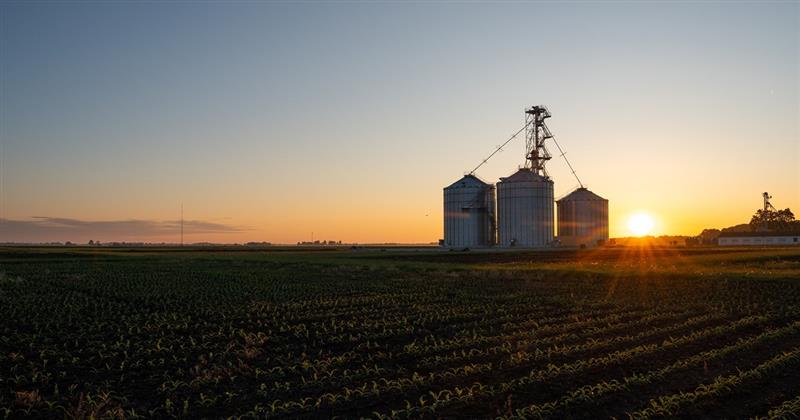Farmer sentiment improves despite financial performance concerns
 Farmer sentiment improves despite financial performance concerns. (Purdue/CME Group Ag Economy Barometer/James Mintert)
Farmer sentiment improves despite financial performance concerns. (Purdue/CME Group Ag Economy Barometer/James Mintert) Three broad-based measures of farmer sentiment improved in July as the Purdue University/CME Group Ag Economy Barometer index rose 8 points to 113, the Index of Current Conditions increased by 10 points to 100, and the Index of Future Expectations at 119 was 7 points higher than a month earlier. Despite declines in corn and soybean prices from mid-June to mid-July — Eastern Corn Belt cash prices fell 11% and 5%, respectively — farmer sentiment improved in July. Responses to the individual questions attribute this positive shift to fewer respondents reporting worsened conditions compared to a year ago and a decrease in those expecting negative future outcomes. This month’s Ag Economy Barometer survey was conducted from July 15-19, 2024.
The July survey showed that high input costs remained the biggest concern for 34% of farmers. Additionally, the risk of lower crop and livestock prices continues to worry producers, with 29% citing it as a top concern, up from 25% in June. Reflecting the signals from the Federal Reserve that interest rates have peaked, only 17% of respondents cited rising interest rates as a top concern, down from 23% last month.
The Farm Financial Performance Index dropped 4 points in July to 81, 6 points lower than in July 2023. The decline in financial performance expectations reflected farmers’ worries about weakening commodity prices and high input costs following improvements in the May and June indices. Although production costs for principal crops, including corn and soybeans, have decreased year over year, output prices have also fallen, raising the possibility of a cost-price squeeze for U.S. crop producers.
Despite concerns about farms’ financial performance, the Farm Capital Investment Index rose 6 points in July to 38, though it remains weak, at 7 points lower than in July 2023. This improvement was due to a slight decrease in the number of producers who believe it’s a bad time to make large investments, which dropped from 80% in June to 75% in July.
“Declines in crop prices point to lower producer incomes this year, so the increase in optimism was somewhat puzzling,” said James Mintert, the barometer’s principal investigator and director of Purdue University’s Center for Commercial Agriculture. “Fewer producers citing rising interest rates as a primary concern for the upcoming year corresponds with the modest improvement in their perspectives on capital investments, but respondents continue to express hesitancy to make large investments.”
July saw a small improvement in the Short-Term Farmland Value Expectations Index, rising to 118 from 115 in June. This was driven by more respondents expecting stable farmland values over the next year. At the same time, the Long-Term Farmland Value Expectations Index dropped 6 points from June to 146, with fewer farmers expecting values to rise over the next five years and more anticipating they will remain unchanged.
As nationwide discussions begin for the 2025 crop year’s farmland leases, the July survey revealed that nearly three-fourths (72%) of crop farmer respondents expect cash rental rates to remain roughly the same as in 2024. Among the remaining respondents, views were nearly evenly divided, with 15% anticipating a rise in rates and 13% expecting a decline.
About the Purdue University Center for Commercial Agriculture
The Center for Commercial Agriculture was founded in 2011 to provide professional development and educational programs for farmers. Housed within Purdue University’s Department of Agricultural Economics, the center’s faculty and staff develop and execute research and educational programs that address the different needs of managing in today’s business environment.
About CME Group
As the world’s leading derivatives marketplace, CME Group enables clients to trade futures, options, cash and OTC markets, optimize portfolios, and analyze data — empowering market participants worldwide to efficiently manage risk and capture opportunities. CME Group exchanges offer the widest range of global benchmark products across all major asset classes based on interest rates, equity indexes, foreign exchange, energy, agricultural products and metals. The company offers futures and options on futures trading through the CME Globex® platform, fixed income trading via BrokerTec and foreign exchange trading on the EBS platform. In addition, it operates one of the world’s leading central counterparty clearing providers, CME Clearing.
CME Group, the Globe logo, CME, Chicago Mercantile Exchange, Globex, and E-mini are trademarks of Chicago Mercantile Exchange Inc. CBOT and Chicago Board of Trade are trademarks of Board of Trade of the City of Chicago, Inc. NYMEX, New York Mercantile Exchange and ClearPort are trademarks of New York Mercantile Exchange, Inc. COMEX is a trademark of Commodity Exchange, Inc. BrokerTec and EBS are trademarks of BrokerTec Europe LTD and EBS Group LTD, respectively. The S&P 500 Index is a product of S&P Dow Jones Indices LLC (“S&P DJI”). “S&P®”, “S&P 500®”, “SPY®”, “SPX®”, US 500 and The 500 are trademarks of Standard & Poor’s Financial Services LLC; Dow Jones®, DJIA® and Dow Jones Industrial Average are service and/or trademarks of Dow Jones Trademark Holdings LLC. These trademarks have been licensed for use by Chicago Mercantile Exchange Inc. Futures contracts based on the S&P 500 Index are not sponsored, endorsed, marketed or promoted by S&P DJI, and S&P DJI makes no representation regarding the advisability of investing in such products. All other trademarks are the property of their respective owners.
About Purdue Agriculture
Purdue University’s College of Agriculture is one of the world’s leading colleges of agricultural, food, life and natural resource sciences. The college is committed to preparing students to make a difference in whatever careers they pursue; stretching the frontiers of science to discover solutions to some of our most pressing global, regional and local challenges; and, through Purdue Extension and other engagement programs, educating the people of Indiana, the nation and the world to improve their lives and livelihoods. To learn more about Purdue Agriculture, visit this site.
About Purdue University
Purdue University is a public research university leading with excellence at scale. Ranked among top 10 public universities in the United States, Purdue discovers, disseminates and deploys knowledge with a quality and at a scale second to none. More than 106,000 students study at Purdue across multiple campuses, locations and modalities, including more than 57,000 at our main campus locations in West Lafayette and Indianapolis. Committed to affordability and accessibility, Purdue’s main campus has frozen tuition 14 years in a row. See how Purdue never stops in the persistent pursuit of the next giant leap — including its integrated, comprehensive Indianapolis urban expansion; the Mitch Daniels School of Business; Purdue Computes; and the One Health initiative — at https://www.purdue.edu/president/strategic-initiatives.
Writer: Morgan French, mmfrench@purdue.edu
Media contact: Alissa Good, Purdue University, aissa@purdue.edu, 765-496-3884; Dana Schmidt, CME Group, dana.schmidt@cmegroup.com, 312-872-5443
Agricultural Communications: Maureen Manier, mmanier@purdue.edu, 765-494-8415




